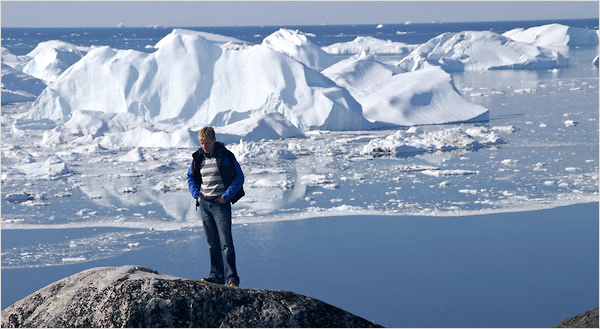|
Reviews of Recent Independent, Foreign, & Documentary Films in Theaters and DVD/Home Video

COOL IT A noble spirit lies behind Ondi Timoner’s new documentary. Focusing on Danish academic and entrepreneur Bjorn Lomborg, author of the contentious book The Skeptical Environmentalist, the film poises itself as a pragmatic version of An Inconvenient Truth. Decrying the alarmist tone and costly solutions that that documentary promoted, Cool It instead serves as a hagiography for Lomborg as he searches for cost-effective solutions to climate change. Unfortunately, by wrapping this pragmatism in the guise of an advertisement, Timoner and Lomborg end up suffocating whatever noble aims they started out from. This isn’t to say the film doesn’t mean well. There is a lot of good Cool It attempts to do. The loose narrative follows Lomborg’s story, from the controversy that erupted after his book was published to his founding of the Copenhagen Consensus Center and his search for affordable alternative energy sources. Lomborg’s point is simple: if you look at the data, global warming is real but not as dire as many—namely Al Gore—claim. Furthermore, the alarmist tone brings about political solutions that, on a cost-benefit analysis, are ludicrous. For Lomborg, this is like curing the patient by bankrupting her and then killing her anyway. Again, a noble point, one that Cool It makes repeatedly. This is fine. It’s a single-issue documentary with a goal: rehabilitating Lomborg’s ideas, saving them from the muck of controversy and putting a positive spin on them. Detractors are defeated; opponents disarmed with a bon mot from the lectern; and all of Lomborg’s points backed up by scientists, thereby legitimating his notions. If anything, Cool It is a fascinating look into the sociology of science. How do scientists come to agreement on a point? What happens when there are arguments? Though all of these interesting questions are tangentially examined, the film, by helping Lomborg promote his ideas about climate change, comes off at best as propaganda and at worst as a glossy infomercial. It would be one thing if a range of opinions had been surveyed and then Lomborg presented an argument against them and for his own, but instead, Timoner presents a false dilemma: either Al Gore or Lomborg is right when, truly, an entire range of opinion exists. By eliminating that range or reducing them to straw men, Lomborg doesn’t do his case justice, and it merely comes off as PR for his point. Despite this, I’m sympathetic to Lomborg and his goals. It’s true, as he and Timoner point out, that the current climate change solutions they examine are woefully ill-equipped to deal with the seriousness of the problem, and in the case of cap and trade, a market-based program aimed at reducing pollution, merely just giveaways to large investment banks. However right Lomborg’s negative argument is, though, the positive one he makes—making alternative energy affordable—has just as many flaws. Lomborg, a techno-utopian, believes that all the problems of humankind can be solved in some way by technology. He begins making this contentious point without ever giving any evidence that it’s true. Additionally, Lomborg is a businessman, an adjunct professor at Copenhagen Business School, and an entrepreneur. He takes it as foundational—and unquestionable—that all solutions have to be profit based and that it’s silly to ask people to change how they live their lives. At one point, he mocks Earth Hour, an initiative whereby everyone was supposed to turn out their lights for an hour to save energy. This might be a worthless—or perhaps just symbolic—action, but he blithely dismisses the possibility that perhaps to save the Earth we must drastically change the way we live, and in doing so, he advances a very weak argument.
Cool It
isn’t cynical propaganda, however. Lomborg really believes what he’s
trying to sell, but the slick salesman’s pitch and the upbeat background
music as he describes the new technologies that are going to save us end
up undercutting that point. More like a film for Lomborg’s investors,
all the goodwill in the world can’t overcome what’s essentially Jack
Lemmon begging us for the leads.
Andrew Beckerman
|

